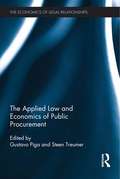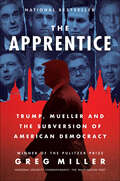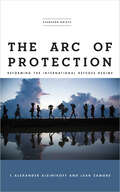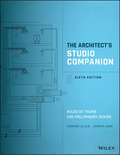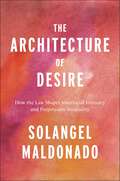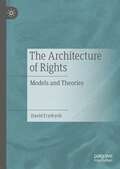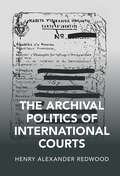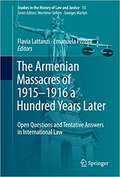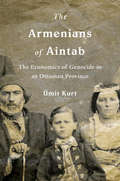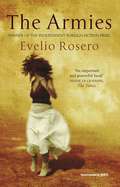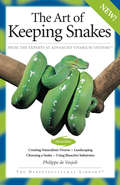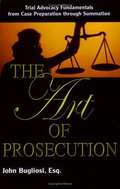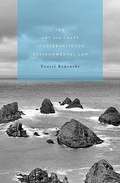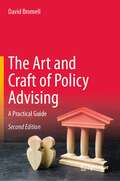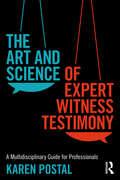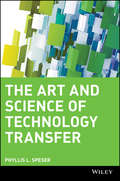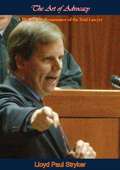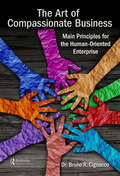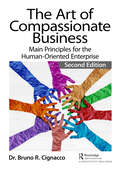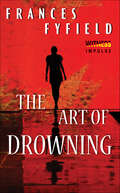- Table View
- List View
The Applied Law and Economics of Public Procurement: Applied Law And Economics Of Public Procurement (The Economics of Legal Relationships)
by Steen Treumer Gustavo PigaThis book explores Public Procurement novelties and challenges in an interdisciplinary way. The process whereby the public sector awards contracts to companies for the supply of works, goods or services is a powerful instrument to ensure the achievement of new public goals as well as an efficient use of public funds. This book brings together the papers that have been presented during the "First Symposium on Public Procurement", a conference held in Rome last summer and to be repeated again yearly. As Public Procurement touches on many fields (law, economics, political science, engineering) the editors have used an interdisciplinary approach to discuss four main topics of interest which represent the four different parts in which this book is divided: Competitive dialogue and contractual design fostering innovation and need analysis, Separation of selection and award criteria, including exclusion of reputation indicators like references to experience, performance and CV’s from award criteria, Retendering a contract for breach of procurement rules or changes to contract (contract execution), Set-asides for small and medium firms, as in the USA system with the Small Business Act that reserves shares of tenders to SMEs only.
The Appointment: What Your Doctor Really Thinks During Your Ten-Minute Consultation
by Dr Graham EastonDespite the modern trend towards empowering patients and giving them more choice, the nuts and bolts of medical practice largely remain a mystery - a closed box. In fact, the more health information is available on the internet, the more patients can feel swamped and confused. The Appointment offers an intimate and honest account of how a typical GP tries to make sense of a patient's health problems and manage them within the constraints of their health system and the short ten minute appointment. We have always been fascinated by our own health but in recent years, especially for older people, seeing the GP has become a regular activity. In the past decade the average number of times a patient visits his or her GP has almost doubled. Despite this increasing demand, getting to see a GP is not always easy so those intimate ten minutes with the doctor are extremely precious, and there's more than ever to cram in. Taking the reader through a typical morning surgery, The Appointment shines a light onto what is really going on in those central ten minutes and lets the reader, for the first time, get inside the mind of the person sitting in front of them - the professional they rely on to look after their health. Experienced GP Dr Graham Easton shows how GPs really think, lays bare their professional strengths and weaknesses, and exposes what really influences their decisions about their patients' health.
The Apprentice: Trump, Mueller and the Subversion of American Democracy
by Greg MillerFrom two-time Pulitzer Prize–winning Washington Post national security reporter Greg Miller, the truth about Vladimir Putin’s covert attempt to destroy Hillary Clinton and help Donald Trump win the presidency, its possible connections to the Trump campaign, Robert Mueller’s ensuing investigation of the president and those close to him, and the mystery of Trump’s steadfast allegiance to Putin.It has been called the political crime of the century: a foreign government, led by a brutal authoritarian leader, secretly interfering with the American presidential election to help elect the candidate of its choice. Now two-time Pulitzer Prize–winning Washington Post national security reporter Greg Miller investigates the truth about the Kremlin’s covert attempt to destroy Hillary Clinton and help Donald Trump win the presidency, Trump’s steadfast allegiance to Vladimir Putin, and Robert Mueller’s ensuing investigation of the president and those close to him. Based on interviews with hundreds of people in Trump’s inner circle, current and former government officials, individuals with close ties to the White House, members of the law enforcement and intelligence communities, foreign officials, and confidential documents, The Apprentice offers striking new information about:the hacking of the Democrats by Russian intelligence;Russian hijacking of Facebook and Twitter;National Security Adviser Michael Flynn’s hidden communications with the Russians;the attempt by Jared Kushner, Trump’s son-in-law, to create a secret back channel to Moscow using Russian diplomatic facilities;Trump’s disclosure to Russian officials of highly classified information about Israeli intelligence operations;Trump’s battles with the CIA and the FBI and fierce clashes within the West Wing;Trump’s efforts to enlist the director of national intelligence and the director of the National Security Agency to push back against the FBI’s investigation of his campaign;the mysterious Trump Tower meeting;the firing of FBI Director James Comey;the appointment of Mueller and the investigation that has followed;the tumultuous skirmishing within Trump’s legal camp;and Trump’s jaw-dropping behavior in Helsinki. Deeply reported and masterfully told, The Apprentice is essential reading for anyone trying to understand Vladimir Putin’s secret operation, its catastrophic impact, and the nature of betrayal.
The Arc of Protection: Reforming the International Refugee Regime
by T. Alexander Aleinikoff Leah ZamoreThe international refugee regime is fundamentally broken. Designed in the wake of World War II to provide protection and assistance, the system is unable to address the record numbers of persons displaced by conflict and violence today. States have put up fences and adopted policies to deny, deter, and detain asylum seekers. People recognized as refugees are routinely denied rights guaranteed by international law. The results are dismal for the millions of refugees around the world who are left with slender prospects to rebuild their lives or contribute to host communities. T. Alexander Aleinikoff and Leah Zamore lay bare the underlying global crisis of responsibility. The Arc of Protection adopts a revisionist and critical perspective that examines the original premises of the international refugee regime. Aleinikoff and Zamore identify compromises at the founding of the system that attempted to balance humanitarian ideals and sovereign control of their borders by states. This book offers a way out of the current international morass through refocusing on responsibility-sharing, seeing the humanitarian-development divide in a new light, and putting refugee rights front and center.
The Architect's Studio Companion: Rules of Thumb for Preliminary Design
by Edward Allen Joseph IanoThe time-saving resource every architect needs The Architect's Studio Companion is a robust, user-friendly resource that keeps important information at your fingertips throughout the design process. It includes guidelines for the design of structure, environmental systems, parking, accessibility, and more. This new sixth edition has been fully updated with the latest model building codes for the U. S. and Canada, extensive new information on heating and cooling systems for buildings, and new structural systems, all in a form that facilitates rapid preliminary design. More than just a reference, this book is a true companion that no practicing architect or student should be without. This book provides quick access to guidelines for systems that affect the form and spatial organization of buildings and allows this information to be incorporated into the earliest stages of building design. With it you can: Select, configure, and size structural systems Plan for building heating and cooling Incorporate passive systems and daylighting into your design Design for parking and meet code-related life-safety and accessibility requirements Relying on straightforward diagrams and clear written explanations, the designer can lay out the fundamental systems of a building in a matter of minutes--without getting hung up on complicated technical concepts. By introducing building systems into the early stages of design, the need for later revisions or redesign is reduced, and projects stay on time and on budget. The Architect's Studio Companion is the time-saving tool that helps you bring it all together from the beginning.
The Architecture of Desire: How the Law Shapes Interracial Intimacy and Perpetuates Inequality (Families, Law, and Society #26)
by Solangel MaldonadoExplores the reach of the law into our most personal and private romantic livesThe Architecture of Desire examines how the law influences our most personal and private choices—who we desire and choose as intimate partners—and explores the psychological, economic, and social effects of these choices. Romantic preferences, as shaped by law, perpetuate segregation and subordination by limiting, on the basis of race, individuals’ prospects for marriage and marriage-like commitments, as well as economic and social mobility.The book begins by tracing the legacy of slavery, anti-miscegenation, segregation, and racially discriminatory immigration laws to show how this legal landscape facilitated the residential, economic, and social distance between racial and ethnic groups, which in turn continue to shape romantic preferences today. Solangel Maldonado argues that the law further influences intimate choices by structuring the spaces within which individuals meet and interact via practices such as redlining, gentrification, and zoning.Maldonado includes studies of online and offline dating preferences to demonstrate that romantic predilections follow a gendered racial hierarchy in which Whites are at the top, African-Americans at the bottom, and—depending on skin tone—Asian-Americans and Latinos in the middle. These preferences may be explicit, implicit, or both, but they are usually the result of stereotypes reflected in social and cultural norms. Furthermore, since marriage confers substantial legal, economic, and social advantages, sexual racism further limits an individual’s opportunity to find a partner and reap these benefits. Finally, the book proposes ways to minimize the law’s influence over who we desire, love, and bring into our families, such as changes to dating platforms as well as to housing, education, and transportation policies.
The Architecture of Rights: Models and Theories
by David FrydrychWhat is a right? What, if anything, makes rights different from other features of the normative world, such as duties, standards, rules, or principles? Do all rights serve some ultimate purpose? In addition to raising these questions, philosophers and jurists have long been aware that different senses of ‘a right’ abound. To help make sense of this diversity, and to address the above questions, they developed two types of accounts of rights: models and theories. This book explicates rights modelling and theorising and scrutinises their methodological underpinnings. It then challenges this framework by showing why the theories ought to be abandoned. In addition to exploring structural concerns, the book also addresses the various ways that rights can be used. It clarifies important differences between rights exercise, enforcement, remedying, and vindication, and identifies forms of legal rights-claiming and rights-invoking outside of institutional contexts.
The Archival Politics of International Courts (Cambridge Studies in Law and Society)
by Henry Alexander RedwoodThe archives produced by international courts have received little empirical, theoretical or methodological attention within international criminal justice (ICJ) or international relations (IR) studies. Yet, as this book argues, these archives both contain a significant record of past violence, and also help to constitute the international community as a particular reality. As such, this book first offers an interdisciplinary reading of archives, integrating new insights from IR, archival science and post-colonial anthropology to establish the link between archives and community formation. It then focuses on the International Criminal Tribunal for Rwanda's archive, to offer a critical reading of how knowledge is produced in international courts, provides an account of the type of international community that is imagined within these archives, and establishes the importance of the materiality of archives for understanding how knowledge is produced and contested within the international domain.
The Armenian Massacres of 1915–1916 a Hundred Years Later: Open Questions And Tentative Answers In International Law (Studies In The History Of Law And Justice #15)
by Flavia Lattanzi Emanuela PistoiaExamines the legal nature and consequences of the Armenian massacres of 1915-1916.<p><p> Deals with various interesting questions of international law raised by the topic.<P> Explores how the massacres and the response to them have affected Turkey’s relations with the European Union.<P>This peer-reviewed book features essays on the Armenian massacres of 1915-1916. It aims to cast light upon the various questions of international law raised by the matter. The answers may help improve international relations in the region. In 1915-1916, roughly a million and a half Armenians were murdered in the territory of the Ottoman Empire, which had been home to them for centuries. Ever since, a dispute between Armenians and Turkey has been ongoing over the qualification of the massacres. The contributors to this volume examine the legal nature and consequences of this event. Their investigation strives to be completely neutral and technical. The essays also look at the broader issue of denial. For instance, in Turkey, public speech on the matter can still trigger criminal prosecution whereas in other European States denial of genocide, war crimes and crimes against humanity is criminalized. However, the European Court of Human Rights views criminal prosecution of denial of the Armenian massacres as unlawful. In addition, one essay considers a state’s obligation to remember by looking at lessons learnt from the Inter-American Court of Human Rights. Another contributor looks at a collective right to remember and some ideas to move forward towards a solution. Moreover, the book explores the way the Armenian massacres have affected the relationship between Turkey and the European Union.
The Armenians of Aintab: The Economics of Genocide in an Ottoman Province
by Ümit KurtA Turk’s discovery that Armenians once thrived in his hometown leads to a groundbreaking investigation into the local dynamics of genocide. Ümit Kurt, born and raised in Gaziantep, Turkey, was astonished to learn that his hometown once had a large and active Armenian community. The Armenian presence in Aintab, the city’s name during the Ottoman period, had not only been destroyed—it had been replaced. To every appearance, Gaziantep was a typical Turkish city. Kurt digs into the details of the Armenian dispossession that produced the homogeneously Turkish city in which he grew up. In particular, he examines the population that gained from ethnic cleansing. Records of land confiscation and population transfer demonstrate just how much new wealth became available when the prosperous Armenians—who were active in manufacturing, agricultural production, and trade—were ejected. Although the official rationale for the removal of the Armenians was that the group posed a threat of rebellion, Kurt shows that the prospect of material gain was a key motivator of support for the Armenian genocide among the local Muslim gentry and the Turkish public. Those who benefited most—provincial elites, wealthy landowners, state officials, and merchants who accumulated Armenian capital—in turn financed the nationalist movement that brought the modern Turkish republic into being. The economic elite of Aintab was thus reconstituted along both ethnic and political lines. The Armenians of Aintab draws on primary sources from Armenian, Ottoman, Turkish, British, and French archives, as well as memoirs, personal papers, oral accounts, and newly discovered property-liquidation records. Together they provide an invaluable account of genocide at ground level.
The Armies: Winner of the Independent Foreign Fiction Prize
by Evelio RoseroIn a small town in the mountains of Colombia, Ismael, a retired teacher, spends his mornings gathering oranges in the sunshine and spying on his neighbour as she sunbathes naked in her garden.Returning from a walk one morning he discovers that his wife has disappeared. Then more people go missing, and not-so-distant gunfire signals the approach of war. Most of the villagers make their escape, but Ismael cannot leave without his Otilia. He becomes an unwilling witness to the senseless civil war that sweeps through his country with a tragic inevitability. In The Armies Rosero has created a hallucinatory, relentless, captivating narrative often as violent as the events it describes, told by an old man battered by a reality he no longer recognizes.
The Arsenic Eater's Wife: A brand new dark historical mystery that will keep you guessing
by Tonya MitchellA woman is accused of killing her husband, but is she guilty? Inspired by a true historical case, this spellbinding novel will keep you guessing until the final heart-stopping revelation . . . I&’m on trial for the murder of my husband William. But no one knows the truth about my marriage. I sit in the dock each day and listen to them tell their lies. That William wasn&’t taking arsenic, that he was a nobleman who would never hurt anyone. That I&’m a cunning, deceitful woman who should hang for what I&’ve done. Everyone betrayed me. My best friend, the family, the servants. Even my lover. They think because I purchased arsenic that I&’m the one who poisoned him. They think I&’m dangerous. They think I&’m mad. But when this trial is over it will only be the beginning. Because I won&’t rest until I get my revenge, even if I must claw myself from an unconsecrated grave to do it . . .Praise for Tonya Mitchell&’s A Feigned Madness &“A compelling read for anyone with an interest in Victorian history.&” —Pam Lecky, author of the Lucy Lawrence mysteries &“Vivid, enthralling . . . a knockout.&” —Kim Taylor Blakemore, author of After Alice Fell
The Art Of Keeping Snakes
by Philippe De VosjoliFor author Philippe de Vosjoli, "art is the actualization of a personal vision or message," and de Vosjoli's passion is snakes, which he believes are among the most beautiful animals on earth. Incorporating snakes into a naturalistic vivarium, the way lizards and amphibians usually are, adds a new element to snake keeping, elevating the hobby to a true art form. In The Art of Keeping Snakes, de Vosjoli pursues this concept and provides advice for snake keepers who wish to create beautiful displays for their snakes, putting the animals' welfare and quality of life above all else and simultaneously enhancing their own enjoyment in observing their beautiful snakes in naturalistic environments. Beautifully photographed, inspiring, and informative, The Art of Keeping Snakes is divided into two parts, the first "A New Way to Keep Snakes," discusses design planning, enclosures and background possibilities, substrates, landscaping, plants, heating/lighting, quarantine and introducing the snakes to the vivarium. This part also includes chapters on feeding, handling, health care, and general maintenance and husbandry. The second part, "Best Display Snakes," presents over thirty different snakes, including photographs, physical descriptions, and tips for selection, handling, vivarium design tips, feeding, and breeding. The snakes in this part are divided into chapters, categorized by pythons, boas, water and garter snakes, hognose snakes, rat snakes, kingsnakes and milksnakes, and others. Resources and index included.
The Art Of Prosecution: Trial Advocacy Fundamentals From Case Preparation Through Summation
by John BugliosiLearn to solidify cases every step of the way, from the first swing of the judge's gavel to the last. Perfect for practicing prosecutors, law enforcement pros who provide the elements that help win cases and everyone in between. . . including law students! You'll get analyses of 5 top attributes of successful prosecutors - instruction for crafting compelling opening statements & jury-swaying summations - insider tips for selecting the right jury - advice for using questions with surgical precision to dissect testimony and reveal truth - plus case-winning witness prep instructions!
The Art and Craft of International Environmental Law
by Daniel BodanskyThe book focuses on the processes by which international environmental law is developed, implemented and enforced rather than on the substance of international environmental law itself-- already the subject of several excellent treatises. Process issues have received increased attention in recent years but have not yet received a book-length treatment. This work aims to fill that gap. Rather than focus on one or two aspects of the international environmental process, it examines the process as a whole, from beginning to end, synthesizing recent research on international environmental negotiations, treaty design, social norms, policy implementation and effectiveness. Understanding the international environmental process involves many disciplines--not only law, but also political science, economics, and, to a more limited degree, philosophy, sociology and anthropology. So this book is multidisciplinary. The aim is to provide the reader with the analytical tools necessary to understand what international environmental law is, how it operates, and what role it can play in addressing environmental problems.
The Art and Craft of Policy Advising: A Practical Guide
by David BromellThis book offers a practical guide for policy advisors and their managers, grounded in the author’s extensive experience as a senior policy practitioner in New Zealand’s Westminster-style system of government. A key message is that effective policy advising is less about cycles, stages and steps, and more about relationships, integrity and communication. Policy making is incremental social problem solving. Policy advising is mostly learned on the job, like an apprenticeship. It starts with careful listening, knowing one’s place in the constitutional scheme of things, winning the confidence of decision makers, skillfully communicating what they need to hear and not only what they want to hear, and learning to lead from behind, scheme virtuously and play nicely with others. The author introduces a public value approach to policy advising that uses collective thinking to address complex policy problems, evidence-informed policy analysis that also factors in emotions and values, and the practice of “gifting and gaining” (rather than “trade-offs”) in the long-term public interest. Theory is illustrated by personal anecdote and each chapter offers practical processes, tools, techniques and questions for reflection, to help readers master the art and craft of policy advising. This second edition has been substantially revised and updated. It provides an expanded, step-by-step approach to stakeholder analysis and prioritisation in relation to an agency’s own strategic frame; it aligns and integrates theory about the public interest, public value and anticipatory governance; and it updates a “fair go” multi-criteria decision analysis matrix with the latest iteration of the N.Z. Treasury’s Living Standards Framework.
The Art and Science of Expert Witness Testimony: A Multidisciplinary Guide for Professionals
by Karen PostalFeaturing in-depth interviews of attorneys, judges, and seasoned forensic experts from multiple disciplines including psychology, medicine, economics, history, and neuropsychology, The Art and Science of Expert Witness Testimony highlights and offers bridges for the areas where the needs and expectations of the courtroom collide with experts’ communication habits developed over years of academic and professional training. Rather than seeing testimony as a one-way download from expert to jurors, The Art and Science of Expert Witness Testimony focuses on the direct, dynamic, unique communication relationship that develops as each juror’s lived experience interacts with the words of experts on the stand. This book expands the academic tradition of "methods-centered credibility" to also include "person-centered credibility," where warmth, confidence, and relentless attention to detail build trust with jurors. Seasoned forensic experts share what they actually say on the stand: their best strategies and techniques for disrupting traditional academic communication and creating access to science and professional opinions with vivid, clear language and strong visuals. The difficult but necessary emotional work of the courtroom is addressed with specific techniques to regulate emotions in order to maintain person-centered credibility and keep the needs of jurors front and center through cross-examination. This innovative compilation of research is essential reading for professionals and practitioners, such as physicians, engineers, accountants, and scientists, that may find themselves experts in a courtroom. The Art and Science of Expert Witness Testimony provides a unique experience for readers, akin to being personally mentored by over eighty-five attorneys, judges, and seasoned experts as they share their observations, insights, and strategies—not to "win" as a defense, prosecution, or plaintiff expert, but to be productive in helping jurors and other triers of fact do their difficult intellectual job in deciding a case.
The Art and Science of Technology Transfer
by Phyllis L. SpeserPraise for The Art & Science of Technology Transfer"Phyl Speser's personality comes across in the text-complicated, intrigued, highly rational, insightful, rich in context, and fun. She had me smiling throughout. This work represents the next chapter of the technology transfer profession's development, where it will be all about getting to market with a studied awareness of value. Phyl gives us the tools to get there with a great read, just the focus we are needing in the profession."--Jill A. Tarzian Sorensen, JDExecutive Director, Johns Hopkins Technology Transfer, The Johns Hopkins University"Phyl Speser is one of the pioneers in developing the modern practice of technology transfer and in The Art & Science of Technology Transfer, she shares her experiences and philosophy in a well-written, highly readable book that is packed with case studies of both success and failure."--Ashley Stevens, Director, Office of Technology Transfer, Boston University"This readable book is a must for anyone wanting to look at the technology transfer process from a novel viewpoint. Rather than just recite the nuts and bolts of the process, it illustrates theoretical concepts with real world, practical examples. Any reader will come away with new and useful ways of looking at, and doing, this business."--Kenneth H. Levin, PHD, Deputy DirectorUniversity of Chicago Office of Technology & Intellectual Property (UCTech)"An amazing compendium of philosophy, science, and practical experience that converge to form, literally, the art and science of technology transfer. On any given page, you may find a quote from Plato, a mathematical formula, an intriguing anecdote by the author, or a practical 'how-to' statement. It's written in a very engaging style that keeps you turning from page to page . . . there's enough material in this book to launch a college course on Technology Transfer-nothing is left out!"--David Snyder, Vice President-Technology Commercialization Science Applications International Corporation (SAIC)"This is an excellent introduction to sorting out the complex world of technology transfer, eminently useful to both practitionersand students. The text is thorough, filled with the practical examples, details, and guidelines useful to learn and practice this often-arcane subject, while never losing sight of an overarching paradigm for getting new technology out of the lab and into the market. I am certain that other teachers will find it as valuable as I have."--Lawrence Aronhime, Faculty Associate and Lecturer, The Johns Hopkins University, 2005 recipient Johns Hopkins Alumni Association Excellence in Teaching Award"A clear and entertaining presentation of the complexities of technology transfer and intellectual property, this book provides usable, practical information to students and practitioners on every page. The Art & Science of Technology Transfer provides a well-crafted immersion in the processes and practices of moving ideas into the marketplace."--Phil Weilerstein, Executive Director,National Collegiate Inventors and Innovators Alliance (NCIIA)
The Art of Advocacy: A Plea for the Renaissance of the Trial Lawyer
by Lloyd Paul StrykerIn this book, which was first published in 1954, U.S. defense attorney Lloyd Paul Stryker takes the reader through every step of a case: the first meeting with the client, the questions to find the facts, the arrival in court on the first day of the trial, the selection of jurors, the carefully collected information about the characters of the judge and the prosecuting attorney, the importance of the opening address and the summation. Above all, he reveals the fascinating art of cross-examination which he considered to be the greatest weapon in the arsenal of a trial lawyer.The author clears up for all time the matter of legal ethics, of a defense attorney’s responsibility to undertake a defense, and under what circumstances he must refuse it. Also, he tells wonderfully exciting stories about the famous trial lawyers of an earlier day—Martin W. Littleton, Daniel Webster, Rufus Choate—as well as such modern greats as Robert Jackson and John W. Davis.
The Art of Asking: How I learned to stop worrying and let people help
by Amanda PalmerREDISCOVER THE FORGOTTEN ART OF ASKING IN THIS NEW YORK TIMES BESTSELLING BOOK 'Amanda Palmer joyfully shows a generation how to change their lives' Caitlin Moran'To read Amanda Palmer's remarkable memoir about asking and giving is to tumble headlong into her world' Elizabeth Gilbert'The Art of Asking is a book about cultivating trust and getting as close as possible to love, vulnerability, and connection. Uncomfortably close. Dangerously close. Beautifully close' Brene BrownImagine standing on a box in the middle of a busy city, dressed as a white-faced bride, and silently using your eyes to ask people for money. Or touring Europe in a punk cabaret band, and finding a place to sleep each night by reaching out to strangers on Twitter. For Amanda Palmer, actions like these have gone beyond satisfying her basic needs for food and shelter - they've taught her how to turn strangers into friends, build communities, and discover her own giving impulses. And because she had learned how to ask, she was able to go to the world to ask for the money to make a new album and tour with it, and to raise over a million dollars in a month.In the New York TImes bestseller The Art of Asking, Palmer expands upon her popular TED talk to reveal how ordinary people, those of us without thousands of Twitter followers and adoring fans, can use these same principles in our own lives.
The Art of Asking: How I learned to stop worrying and let people help
by Amanda Palmer'When we really see each other, we want to help each other' - Amanda PalmerImagine standing on a box in the middle of a busy city, dressed as a white-faced bride, and silently using your eyes to ask people for money. Or touring Europe in a punk cabaret band, and finding a place to sleep each night by reaching out to strangers on Twitter. For Amanda Palmer, actions like these have gone beyond satisfying her basic needs for food and shelter - they've taught her how to turn strangers into friends, build communities, and discover her own giving impulses. And because she had learned how to ask, she was able to go to the world to ask for the money to make a new album and tour with it, and to raise over a million dollars in a month.In The Art of Asking, Palmer expands upon her popular TED talk to reveal how ordinary people, those of us without thousands of Twitter followers and adoring fans, can use these same principles in our own lives.
The Art of Compassionate Business: Main Principles for the Human-Oriented Enterprise
by Bruno R. CignaccoThere are several well-ingrained assumptions regarding the dynamics of work and business activities, which can be refuted. Some examples of these widespread assumptions in the business and work environments are: employees being viewed as commodities, competitors perceived as threats, companies’ resources seen as limited, and customers perceived as scarce and difficult, etc. All which leads to the question, "Is there a way to perform business activities more humanely?" This book challenges the reader to change the way they perform in business situations and become more focused on the human aspects of business activities. The users of this knowledge and those affected by them will undergo a profound transformation in the way they perform business activities. They will benefit from gradually testing and implementing the guidelines conveyed in this book, both in the business environment and the workplace. When readers put these principles into practice, positive ripple effects are bound to affect other stakeholders of the organization they work for or own. This book includes aspects related to mission and vision, passion, business mindset, organizational learning, improvement of business conversations, use of constructive criticism and improvement of relationships with the most relevant stakeholders (customers, suppliers, intermediaries, community, and employees, etc.). The book also includes a discussion of creativity and the innovation process, as well as other factors that create a healthy business environment. Extensive appendices include topics such as negotiation, marketing, use of social media and others.
The Art of Compassionate Business: Main Principles for the Human-Oriented Enterprise
by Bruno R. CignaccoThere are several well-ingrained assumptions regarding the dynamics of work and business activities, which can be refuted. Some examples of these widespread assumptions in business and work environments are employees being viewed as commodities, competitors perceived as threats, companies’ resources seen as limited, and customers perceived as scarce and difficult. All this leads to the question: "Is there a way to perform business activities more humanely?" The second edition of this book challenges the reader to change the way they perform in business situations and become more focused on the human aspects of business activities. The users of this knowledge and those affected by them will undergo a profound transformation in the way they perform business activities. They will benefit from gradually testing and implementing the guidelines conveyed in this book, both in the business environment and in the workplace. When readers put these principles into practice, positive ripple effects are bound to affect other stakeholders of the organisation they work for or own. The author has refreshed all the concepts and examples introduced in the first edition which include aspects related to mission and vision, passion, business mindset, organisational learning, improvement of business conversations, use of constructive criticism, and betterment of relationships with the most relevant stakeholders (customers, suppliers, intermediaries, community, employees, etc.). The author also includes a discussion of creativity and the innovation process as well as other relevant aspects related to a healthy business environment and provides various real-life examples of companies which have adopted a loving attitude towards their stakeholders – which has become so important in the current business environment.
The Art of Drowning
by Frances FyfieldA loner. A liar. A secret.Let the games begin.Accountant Rachel Doe leads a sheltered, beige-colored life… Until she meets Ivy, who is everything Rachel isn’t. Ivy is a wild child. She is charismatic and seductive, a charmer with tragedy in her past. The two women begin an intense and unexpected friendship.But, as the intimacy between them escalates, Rachel is drawn deeper into the darkness that surrounds Ivy—and the secrets that hide there. In the bestselling tradition of Gone Girl and Reconstructing Amelia, this riveting psychological thriller.
